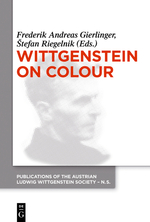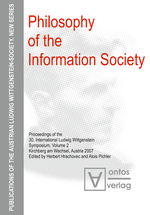Herbert Hrachovec / Jakub Mácha
Platonism

Proceedings of the 43rd International Wittgenstein Symposium in Kirchberg
Anne Siegetsleitner / Andreas Oberprantacher / Marie-Luisa Frick / Ulrich Metschl
Crisis and Critique: Philosophical Analysis and Current Events

Proceedings of the 42nd International Wittgenstein Symposium in Kirchberg
Gabriele M. Mras /Paul Weingartner / Bernhard Ritter
Philosophy of Logic and Mathematics

Proceedings of the 41st International Wittgenstein Symposium in Kirchberg
Christoph Limbeck-Lilienau / Friedrich Stadler
The Philosophy of Perception

Proceedings of the 40th International Wittgenstein Symposium in Kirchberg
Majetschak, Stefan / Weiberg, Anja
Aesthetics Today

Contemporary Approaches to the Aesthetics of Nature and of Arts. Proceedings of the 39th International Wittgenstein Symposium in Kirchberg
Kanzian, Christian / Kletzl, Sebastian / Mitterer, Josef / Neges, Katharina
Realism – Relativism – Constructivism

Proceedings of the 38th International Wittgenstein Symposium in Kirchberg
Rinofner-Kreidl, Sonja / Wiltsche, Harald A.
Analytic and Continental Philosophy

Methods and Perspectives. Proceedings of the 37th International Wittgenstein Symposium
Moyal-Sharrock, Danièle / Munz, Volker / Coliva, Annalisa
Mind, Language and Action

Proceedings of the 36th International Wittgenstein Symposium
Gierlinger, Frederik A. / Riegelnik, Štefan
Wittgenstein on Colour

Greif, Hajo / Weiss, Martin Gerhard
Ethics, Society, Politics

Proceedings of the 35th International Wittgenstein Symposium, Kirchberg am Wechsel, Austria, 2012
Jäger, Christoph / Löffler, Winfried
Epistemology: Contexts, Values, Disagreement

Proceedings of the 34th International Ludwig Wittgenstein Symposium in Kirchberg, 2011
Voß, Henrik
Grenzen grammatischer Willkür bei Wittgenstein
Richard Heinrich, Elisabeth Nemeth, Wolfram Pichler, David Wagner (Eds.)
Image and Imaging in Philosophy, Science and the Arts. Volume 2

Proceedings of the 33rd International Ludwig Wittgenstein-Symposium in Kirchberg, 2010
Richard Heinrich, Elisabeth Nemeth, Wolfram Pichler, David Wagner (Eds.)
Image and Imaging in Philosophy, Science and the Arts. Volume 1

Proceedings of the 33rd International Ludwig Wittgenstein-Symposium in Kirchberg, 2010
Volker Munz / Klaus Puhl / Joseph Wang (Eds.)
Language and World. Part Two

Signs, Minds and Actions
Volker Munz / Klaus Puhl / Joseph Wang (Eds.)
Language and World. Part One

Essays on the Philosophy of Wittgenstein
Elena Tatievskaya
Wittgenstein über das Verstehen

Alexander Hieke / Hannes Leitgeb
Reduction

Between the Mind and the Brain
Alexander Hieke / Hannes Leitgeb (Eds.)
Reduction – Abstraction – Analysis

Proceedings of the 31th International Ludwig Wittgenstein-Symposium in Kirchberg, 2008
John Edelman (Ed.)
Sense and Reality

Essays out of Swansea
Wulf Kellerwessel
Wittgensteins Sprachphilosophie in den „Philosophischen Untersuchungen“

Eine kommentierende Ersteinführung
Christian Kanzian / Volker Munz / Sascha Windholz (Hrsg.)
„Wir hofften, jedes Jahr noch ein weiteres Symposium machen zu können“

Zum 30. Internationalen Wittgenstein Symposium in Kirchberg am Wechsel
Jesús Padilla Gálvez (Ed.)
Phenomenology as Grammar

Herbert Hrachove /, Alois Pichler (Eds.)
Philosophy of the Information Society

Proceedings of the 30th International Ludwig Wittgenstein-Symposium in Kirchberg 2007
Alois Pichler / Herbert Hrachovec (Eds.)
Wittgenstein and the Philosophy of Information

Proceedings of the 30th International Ludwig Wittgenstein-Symposium in Kirchberg, 2007
Christian Kanzian / Muhammad Legenhausen (Eds.)

Substance and Attribute
Georg Gasser (Ed.)
How Successful is Naturalism?

Christian Kanzian / Edmund Runggaldier (Eds.)
Cultures. Conflict – Analysis – Dialogue

Alois Pichler / Simo Säätelä (Eds.)
Wittgenstein : The Philosopher and his Works

Proceedings of the 29th International Ludwig Wittgenstein-Symposium in Kirchberg, Austria 2006.
Friedrich Stadler / Michael Stöltzner (Eds.)
Time and History

Proceedings of the 28. International Ludwig Wittgenstein Symposium, Kirchberg am Wechsel, Austria 2005
All products available in our office.
Contact us, should you want to order any of these books:
Mag. Margret Kronaus
Markt 63
A-2880 Kirchberg am Wechsel
Austria, Europe
Tel./Fax: +43/2641/2557
E-mail: alws@aon.at
































